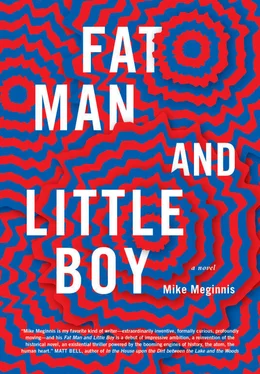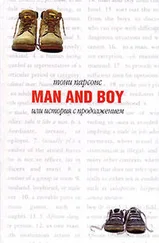It must be a stranger knocking at her door. It must be a small stranger: the door makes a small sound. Francine finishes her cigarette and drops the stub in the trash before going to the door. On second thought, she brings a large knife with her. The small hand knocks again. Put-pat. She peeps through the peephole. There’s the top of a dirty blond head in the hole and a thin white hand drawn back, waiting, shaking. It looks like a girl’s hand, if the girl chewed her nails and her knuckles were knobby and pale. The hand moves as if to knock again and then falls out of sight, defeated. The dirty blond head turns away.
Francine opens the door. There is the blond boy sucking his thumbnail. He shivers pointedly. A fat man steps into view, a real behemoth. He shivers too. When he opens his fat mouth and hazards a greeting in clumsy, fat French, she knows he’s American. He holds out his hands open-palmed, showing her they’re empty, except for a charred blackness and a floppy blue hat that hangs from his fingers.
“Don’t worry,” she says, “I know some English. Come in, come in.” She waves them in with her hands and steps back from the doorway, like guiding toddlers. She leaves the knife on the kitchen counter. They follow her inside. The little one rubs his hands on his pink cheeks. He sucks his thumbnail and bites at what spare rind is left.
She tells them to sit at the dinner table and they do. She asks them what they’d like to drink. They both say water. The fat one asks her does she have something they could eat—a crust of bread, or some old fruit perhaps. He says it’s been a day since they’ve eaten. She says yes, there is bread. The man and the boy are looking at each other across the table as if it’s been more than a day since they’ve done that as well, as if they’re surprised to see what they see.
Both wear haggard formerly-blue suits, stained with mud and rain, threadbare at elbows and ankles. Their shirts are untucked and their tails hang with loose white threads. The shirts are yellow with sweat and filth. They set their tired hats on the table and the hats seem to sag beneath the weight of the air. The hats have been slept on many times, used for pillows, turned inside out by angry fists.
The fat man threatens to pour out of his chair at any second—his whole body slumps precipitously in every direction, folds overhanging folds, like a pudding trying to be still. He rests his elbows on the table, holding his face in his hands, sagging glum. The little boy is nervous. He runs a hand through his hair again and again, seeming to feel for fleas. He bounces his legs.
They are both very tired.
Francine butters two slices of bread for each and sets them on the bare table. “Thank you,” says the little boy.
The fat man says, “Merci.”
They eat the buttered bread. When they’re finished the fat man brushes crumbs from the little boy’s face. The gesture is both tender and brusque—he means well, but it looks like it hurts. They sip at their cups. When they’re finished Francine pours more water. She waits for some explanation of who they are, how they came to be here, and what else they expect her to do for them. She feels—she doesn’t know why—it would be rude to ask them. Yet what else can they discuss?
The fat one wipes moisture from his upper lip, where he is growing a regrettable mustache, probably not by choice. He says, “We’ve run out of money.” The little boy nods: they have. “We’re here from America.” The little boy nods again: it’s true. “His parents are dead.” Here the fat man points at the boy, who confirms it. “His father was a GI. His mother killed herself when the news came.”
“Terrible,” says Francine.
“We came here to see where his father died, which we’ve done, and then to start over. I’m his uncle. I am a failure. I’m looking for work.”
“Francine,” she says, extending her hand to the boy first.
“Matthew.” He takes her hand in both of his, shakes it three times, and doesn’t let go. His skin is still cold.
“John,” says the fat man, and he takes her other hand. The three of them are joined together. A portentous feeling passes through them. Francine notices the fat man is looking at her stomach with an expression of deep concern.
She slips out of their hands, which fall to the table among the crumbs of buttered bread. “Is something wrong?”
“Not at all,” says John. “I was thinking how beautiful you are. I hope that’s all right.”
“Flattery,” says Francine, lowering her eyes. “So you need somewhere to stay the night.”
Matthew nods. “The floor will be fine,” he says. “It’s cold out.”
“You can stay in the living room. Use the sofa if you like. If anyone comes into the house, don’t worry. He’s supposed to be here. I’ll tell him the same about you.”
She puts their cups in the sink, turning her back on her visitors. She runs the faucet a little. “Not that I think there will be anyone coming. You can tell me everything tomorrow. I’ll try to help you find work.”
“I don’t want to sound ungrateful, but my curiosity overwhelms my better judgment. Why are you helping us?” says John. “I noticed you answered the door holding a knife.”
She turns off the faucet. The three share her home’s quiet. They commune with the still air and its faint chill.
“I’m lonely tonight,” says Francine.
There’s a white bust on the mantel in the living room. An old, bald white-skinned and white-haired man who looks like milk poured into a mold and frozen forever. His gaze is crisp, patient, brave, fogged, stern, shallow—lifeless. He wears a white mustache. It is smooth and featureless, not hair but a guard for his lip, a beetle shell on his face. Beside him on the mantel sits a dandy military cap.
“Who’s that?” asks John. He has claimed the sofa. Matthew curls up in a worn chair. Francine takes down the bust, cradling the old man’s head and shoulders against her breast. He stares blankly askance at the fat man.
“This is the marshal,” she says. There is no spark of recognition in the fat man’s eyes. “Pétain.”
“How did you find yourself in possession of so fine a depiction?” says John. Francine wonders if he talks more the more tired he is—all the shiver has gone out of his pudding and now he seems so close to perfectly still, eternally slouched.
“Most people around here have one. They made quite a few. They were everywhere for a while. These days, most paint them, usually as a joke. Sometimes as another kind of statement. If you see someone who painted his Pétain realistically, it probably means he’s a supporter, or at least a mourner.” She puts the head back on the mantel. “Unless there’s an emphasis on liver spots, wrinkles, or other deformities. Then it’s hard to say.”
“He’s white,” says Matthew. “You left him blank.”
“I guess I don’t know how to paint him,” says Francine. She puts the dandy cap on his head. It casts a snug shadow over his face. “We like to put the hat on him for formal occasions. I guess that would be you.”
The fat man adjusts his yellowed collar. “A formal occasion,” he says, closing his eyes. “Me. Like a small dinner party, or a banquet. I like that.”
The little boy laughs. “You’d be some banquet.”
Francine lies in bed, knowing her husband will not be home until morning. She considers staying up, waiting—it’s already nearly sunrise. She wants to suffer. She wants him to come home and see that she’s suffered. She wants him to feel guilt, for once, or fear—fear of what she might do in her exhaustion, in her exhausted rage.
There are strange, hungry people downstairs. The marshal overlooks them, smart as a puffin in his cap and smooth mustache. His skin is colder than the air, colder than the windows.
Читать дальше












